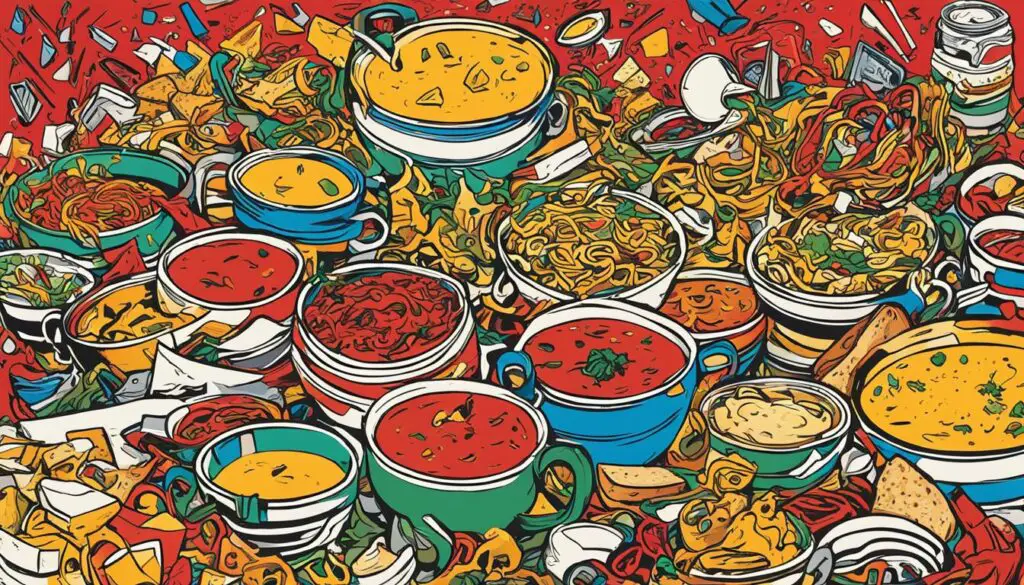In slang terms, a “soup sandwich” refers to a messy or disorganized situation. It is an idiom commonly used to describe chaos or confusion. The term originates from the imagery of trying to eat a sandwich made of soup, which would be impossible and very messy. The phrase has gained popularity and is often used to describe situations or individuals that are in disarray or not functioning properly.
Key Takeaways:
- The term “soup sandwich” is slang for a chaotic or disorganized situation.
- The phrase originated from the military and has since become part of everyday language.
- Variations of the idiom, such as “hot mess” or “complete disaster,” are often used for emphasis.
- “Soup sandwich” is recognized in popular culture and online resources like Urban Dictionary.
- When encountering a “soup sandwich,” it’s important to work towards finding a resolution or bringing order to the situation.
The Origin of the Term ‘Soup Sandwich’
The exact origin of the phrase “soup sandwich” is unclear, but it is believed to have originated in the military. The military is known for its extensive use of slang and idioms, and “soup sandwich” is one of them. It is thought to have come from the absurdity and messiness of trying to eat a sandwich made of soup. Over time, the phrase has found its way into everyday language and is used to describe chaotic or disordered situations.
Usage of ‘Soup Sandwich’ in Everyday Language
While the term soup sandwich originated in the military, it has transcended its origins and become a part of everyday language. This unique idiom is often used informally to describe situations, individuals, or events that are disorganized, chaotic, or simply not functioning properly. The phrase has made its way into popular culture and is widely understood, even by those who have not served in the military. It has become a slang expression that effectively conveys a sense of disorder or confusion.
People use the term soup sandwich to vividly describe situations where everything seems to be in disarray, resembling the challenge of eating a sandwich made entirely of soup. The phrase has gained popularity for its ability to succinctly capture the essence of chaos and dysfunction. Whether it’s a messy project, a poorly organized event, or a person who can’t seem to get their act together, calling it a “soup sandwich” paints a colorful picture of the situation.
“The whole office was a soup sandwich today – files were misplaced, meetings were rescheduled, and no one seemed to know what was going on!”
The versatility of the term allows it to be used in various contexts, from casual conversations to humorous remarks. It has become a familiar phrase in everyday language, offering a playful way to describe scenarios that lack order or coherence.
Popular Variations of the ‘Soup Sandwich’ Idiom
While the phrase “soup sandwich” is most commonly used, there are variations and extensions that add depth and emphasis to the description. One popular variation is the use of modifiers such as “hot mess” or “complete disaster” to further portray the level of chaos or disarray. For instance, someone might say, “That meeting was a complete soup sandwich – no agenda, constant interruptions, and nothing accomplished.”
In addition, the idiom is sometimes used in a light-hearted or exaggerated way to add humor and intensity to a situation. The flexibility of the phrase allows it to be adapted to different contexts while still conveying the underlying message of disorder or confusion.
| Examples of ‘Soup Sandwich’ Uses |
|---|
| “The team’s project presentation was a soup sandwich – slides were out of order, speakers stumbled, and time management was a disaster!” |
| “Trying to organize the fundraiser was a soup sandwich – volunteers canceled last minute, donations were misplaced, and there was no clear plan.” |
| “The new employee’s first day was a complete soup sandwich – they couldn’t find their desk, technology didn’t work, and they were given conflicting instructions.” |
The cultural impact of the “soup sandwich” idiom is evident in its widespread usage and recognition. It has become a part of slang and colloquial language, resonating with people who understand and relate to the imagery of a messy sandwich made of soup.

Variations of the ‘Soup Sandwich’ Idiom
The soup sandwich idiom, known for depicting chaotic or disorganized situations, has evolved to include variations and extensions that add nuance and emphasis. These modifications often involve the use of modifiers like hot mess or complete disaster, intensifying the level of chaos or disarray. For instance, someone may exclaim, “That meeting was a complete soup sandwich!” to emphasize the disorganized nature of the gathering.
This popular slang phrase is also employed in a humorous or exaggerated manner to vividly depict a situation or event. It serves as a colorful expression that captures the essence of disorder and confusion. While soup sandwich remains the most common form of the idiom, these variations contribute to a broader range of descriptors that enrich the overall meaning and impact.
Soup Sandwich Variations and Examples:
| Variation | Example |
|---|---|
| Hot Mess | “Her room was a hot mess, a true soup sandwich.” |
| Complete Disaster | “The project turned into a complete soup sandwich, with missed deadlines and miscommunication.” |
| Clusterf*** | “The party planning turned into a total clusterf***, a soup sandwich of confusion.” |
These variations allow individuals to express their experiences and observations with added intensity, humor, or vividness. By employing different modifiers and embellishments, the idiom becomes more adaptable and expressive, accurately capturing the essence of a disorganized or chaotic situation.
Stay tuned as we explore the cultural impact of the soup sandwich idiom and its usage in everyday language.
Cultural Impact of ‘Soup Sandwich’
The phrase “soup sandwich” has gained significant recognition in popular culture and has become a part of everyday language. With its widespread usage and understanding among contemporary audiences, it has solidified its place in slang and colloquialism. The term has even made its way into online resources like Urban Dictionary, showing its resonance with people.
Informal conversations, internet forums, and social media platforms are common spaces where the phrase is used to describe chaotic or disorganized situations. Its adoption as a slang expression reflects its ability to capture the essence of disorder and confusion.
Examples of ‘Soup Sandwich’ in Context
The “soup sandwich” idiom can be applied in various situations to describe chaos and disorder. Here are a few examples that illustrate its meaning:
“The project presentation was a complete soup sandwich. The team was unprepared, the slides were disorganized, and there was no clear message.”
In this example, the phrase “soup sandwich” highlights the disarray and lack of preparedness in the project presentation.
“The party was a soup sandwich. People showed up at different times, the food was not ready, and there was no clear plan.”
This instance demonstrates how the idiom is used to describe a disorganized and chaotic social event.
“The company’s financial records were a soup sandwich. The numbers didn’t add up, documents were missing, and it was difficult to make sense of the situation.”
Here, the “soup sandwich” idiom emphasizes the disorder and confusion surrounding the company’s financial records.
| Example | Description |
|---|---|
| “The meeting was a soup sandwich” | The meeting was disorganized and lacked structure. |
| “His schedule is a soup sandwich” | His schedule is chaotic, with conflicting appointments and no clear plan. |
| “The traffic in the city is a soup sandwich” | The traffic in the city is in disarray, causing delays and confusion. |
These examples showcase how the “soup sandwich” idiom can be used to describe various scenarios characterized by chaos, disorder, and confusion.

Image: A visual representation of the chaos and disorder associated with a “soup sandwich”
Conclusion
The expression “soup sandwich” has become a widely-used idiom to describe chaotic or disorganized situations. Its origin in the military has given it a cultural significance and widespread recognition. The phrase conveys a sense of disorder, confusion, and ineffectiveness.
While humorous and vivid, it has also become a part of everyday language, resonating with people who are familiar with its meaning. When encountering a situation that feels like a “soup sandwich,” it is important to recognize the chaos and work towards finding a resolution or a way to bring order to the situation.
Whether used in casual conversations or online exchanges, the phrase has gained popularity and is now understood by many. Its specificity and imagery make it a powerful way to describe situations that are not functioning properly or are in disarray. Moving forward, it remains a colorful and relatable expression that captures the essence of chaos in a unique and memorable way.
FAQ
What does the term "soup sandwich" mean?
In slang terms, a “soup sandwich” refers to a messy or disorganized situation. It is often used to describe chaos or confusion.
Where does the term "soup sandwich" come from?
The exact origin of the phrase is unclear, but it is believed to have originated in the military.
How is the term "soup sandwich" used in everyday language?
It is often used informally to describe situations or individuals that are in disarray or not functioning properly.
Are there variations of the "soup sandwich" idiom?
Yes, the phrase can be modified with terms like “hot mess” or “complete disaster” to emphasize the level of chaos or disarray.
What is the cultural impact of the "soup sandwich" phrase?
The phrase has become recognized in popular culture and is used in informal conversations, online resources, and social media.
Can you provide examples of how "soup sandwich" is used in context?
Sure, for example, someone might say, “That meeting was a complete soup sandwich.”
What is the conclusion regarding the meaning of "soup sandwich"?
The term “soup sandwich” is a slang expression used to convey a sense of disorder or confusion in various situations.
